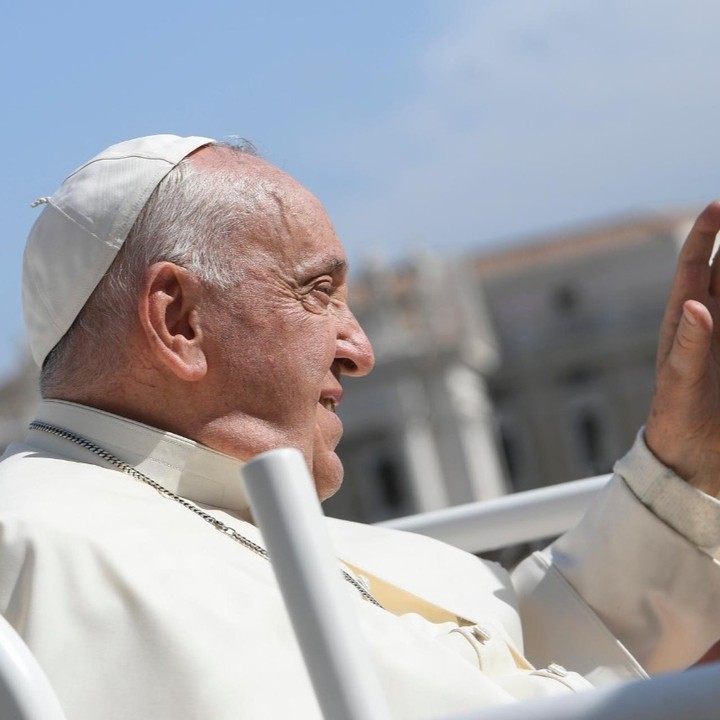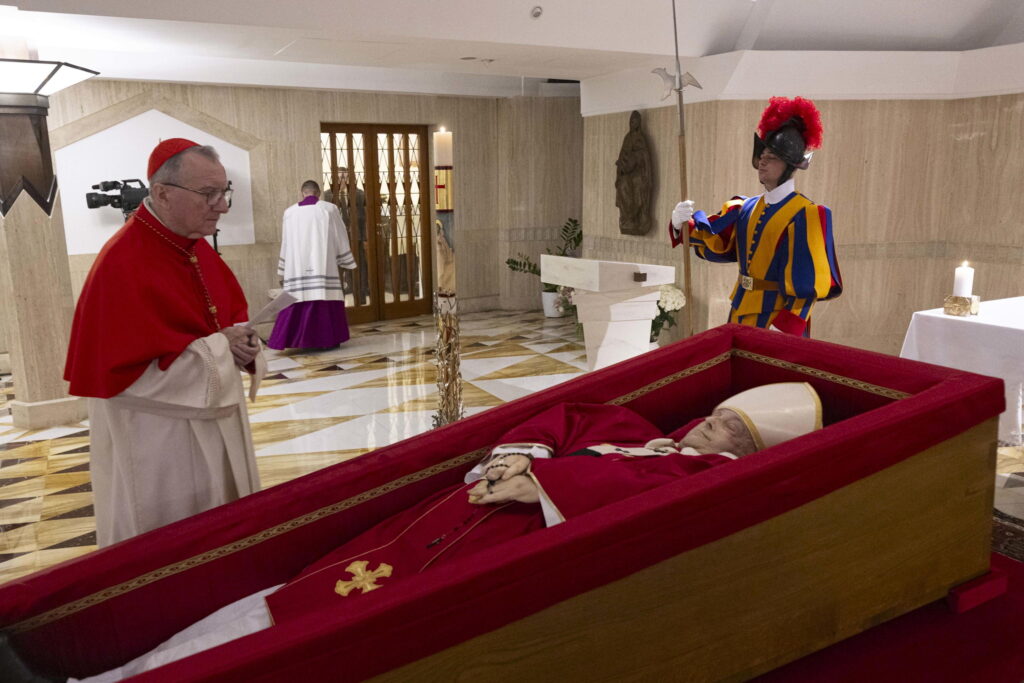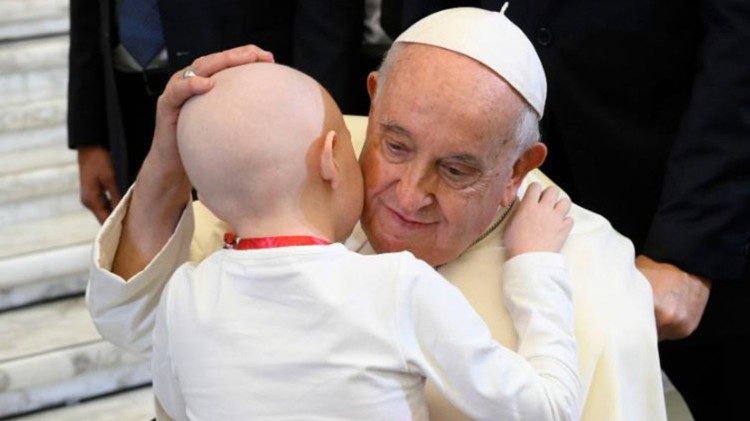The Holy Spirit expands and unites the Church
General Audience

The following text includes parts that were not read out loud, but should be considered as such.
Cycle of Catechesis. The Spirit and the Bride. The Holy Spirit guides the people of God towards Jesus our hope. 8.«They were all filled with the Holy Spirit» The Holy Spirit in the Acts of the Apostles
Dear brothers and sisters, good morning!
In our itinerary of catechesis on the Holy Spirit and the Church, today we will refer to the Book of the Acts of the Apostles.
The account of the descent of the Holy Spirit at Pentecost begins with a description of some preparatory signs – the rush of wind and the tongues of fire – but finds its conclusion in the affirmation that “they were all filled with the Holy Spirit” (Acts 2:4). Saint Luke – who wrote the Acts of the Apostles – emphasizes that the Holy Spirit is He who ensures the universality and unity of the Church. The immediate effect of being “filled with the Holy Spirit” is that the Apostles “began to speak in other tongues”, and came out of the Upper Room to proclaim Jesus Christ to the crowd (cf. Acts 2:4 et seq.).
In so doing, Luke wished to highlight the universal mission of the Church, as a sign of a new unity between all peoples. We see the Spirit work for unity in two ways. On the one hand, He drives the Church outwards, so that she can welcome an ever-greater number of people and peoples; on the other hand, she gathers them within to consolidate the unity achieved. He teaches her to expand in universality, and consolidate in unity. Universal and one: this is the mystery of the Church.
We see the first of the two movements – universality – in process in Chapter 10 of the Acts, in the episode of the conversion of Cornelius. On the day of Pentecost, the Apostles had proclaimed Christ to all the Jews and observers of the Mosaic law, whatever people they belonged to. It takes another “Pentecost”, very similar to the first, in the house of the centurion Cornelius, to induce the Apostles to expand their horizon and break down the last barrier, the one between Jews and pagans (cf. Acts 10-11).
This ethnical expansion is accompanied by a geographical one. Paul – we read again in the Acts of the Apostles (cf. 16:6-10) – wanted to proclaim the Gospel in a new region of Asia Minor; but it is written that they had been “forbidden by the Holy Spirit”; he attempted to enter Bithyn’ia, “but the Spirit of Jesus did not allow them”. We immediately discover the reason for these surprising prohibitions of the Spirit: the following night the Apostle received in a dream the order to pass into Macedonia. The Gospel thus left its native Asia and entered into Europe.
The second movement of the Holy Spirit – that which creates unity – is seen in action in Chapter 15 of the Acts, in the proceedings of the so-called Council of Jerusalem. The problem is how to ensure that the universality achieved does not compromise the unity of the Church. The Holy Spirit does not always create unity suddenly, with miraculous and decisive actions, as at Pentecost. He also does so – and in the majority of cases – with discreet work, respecting human time and differences, passing through people and institutions, prayer and confrontation. In, we would say today, a synodal manner. Indeed, this is what happens at the Council of Jerusalem, regarding the matter of the obligations of the Mosaic Law to be imposed on those who converted from paganism. The solution was announced to the entire Church, with the well-known words: “For it has seemed good to the Holy Spirit and to us…” (Acts 15:28).
Saint Augustine explains the unity achieved by the Holy Spirit with an image, which has become classic: “How the soul is of the body of man is the holy Spirit of the body of Christ, which is the Church” [1]. The image helps us to understand something important. The Holy Spirit does not create the unity of the Church from the outside; He does not limit Himself to commanding us to be united. He Himself is the “bond of unity”. It is He who creates the unity of the Church.
As always, we will conclude with a thought that helps us to pass from the Church as a whole to each one of us. The unity of the Church is the unity between people and is not achieved on the drawing board, but in life. It is implemented in life. We all want unity, we all desire it from the depths of our heart; and yet it is so difficult to attain that, even within marriage and the family, union and concord are among the most difficult things to achieve and even harder to maintain.
The reason why unity amog us is difficult is that, yes, everyone wants unity, but based on one’s own point of view, without considering that the other person in front of him thinks exactly the same thing about his “own” point of view. In this way, unity becomes even more elusive. The unity life, the unity of Pentecost, according to the Spirit, is achieved when one makes the effort to put God, not oneself, at the centre. Christian unity is built in this way too: not waiting for others to reach us where we are, but moving together towards Christ.
Let us ask the Holy Spirit to help us be instruments of unity and peace.
_____________________________
[1] Sermons, 267, 4.
____________________________
Special greetings
I extend a warm welcome to the English-speaking pilgrims and visitors, especially those coming from England, Scotland, Denmark, Greece, India, Indonesia and the United States. I greet the new seminarians of the Pontifical Beda College and I assure them of my prayers as they begin their studies for the priesthood. Upon all of you, and upon your families, I invoke the joy and peace of our Lord Jesus Christ. God bless you!
____________________________
Summary of the Holy Father’s words
Dear brothers and sisters: In our continuing catechesis on the Holy Spirit, we now turn to the account of Pentecost in the Book of Acts, which describes the Apostles as being “filled with the Holy Spirit” and sent forth to proclaim the Gospel to the world. In every age, the Spirit guides the Church in her mission to embrace all peoples in the unity of the Body of Christ. Let us ask the Spirit to confirm the Church in fidelity to her unity and universality by drawing all peoples closer to Christ and to one another through the preaching of the Good News of our salvation.
Related

Funeral of Pope Francisco on April 26th in the Plaza de San Pedro
Exaudi Staff
23 April, 2025
3 min

“You give us hope and remind us that God does not forget us” importa
Exaudi Staff
22 April, 2025
5 min

The Best Quotes from Pope Francis During His Pontificate
Exaudi Staff
22 April, 2025
3 min

Pope Francis dies of stroke and irreversible cardiovascular collapse
Exaudi Staff
22 April, 2025
1 min
 (EN)
(EN)
 (ES)
(ES)
 (IT)
(IT)

